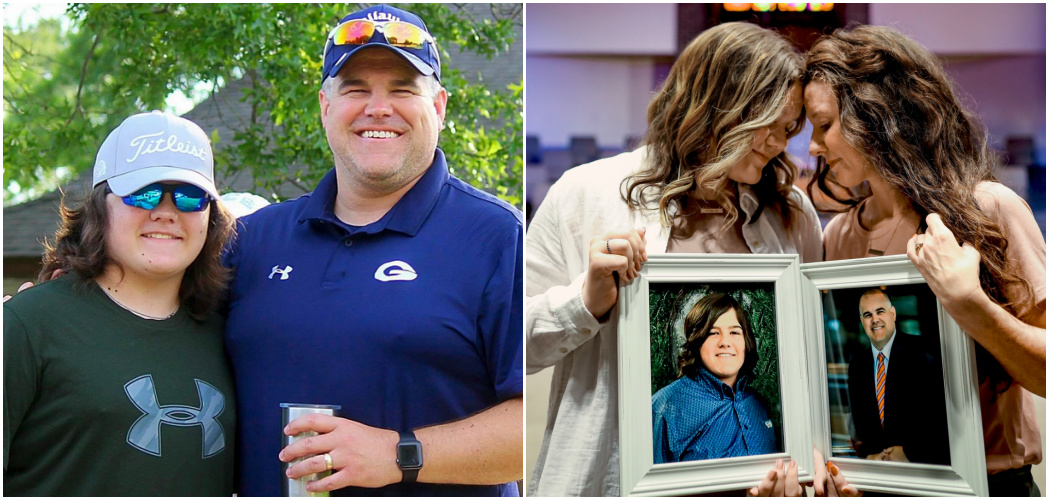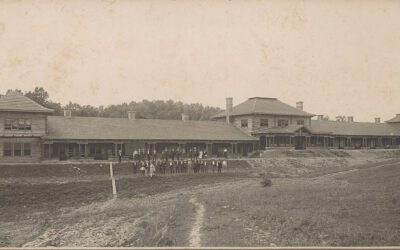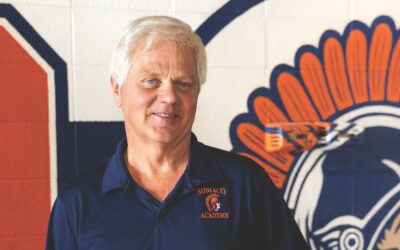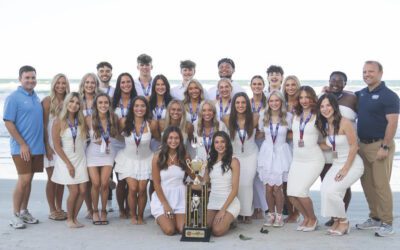[title subtitle=”WORDS Dwain Hebda
IMAGES courtesy Jade Graves”][/title]
In many ways, the 2021-2022 school year dawned the same way it always had in Greenwood, Arkansas. Moms and dads took first-day-of-school photos on front porches of grinning kids in bright new school clothes clutching as-yet-unopened books. High schoolers shuffled off to greet their huddle of pals, sharing gossip before the bell sent them scattering to their classrooms.
Talk around this close-knit town is about the prospects of the powerhouse football team, the defending state champion, and their chances to repeat. Everywhere you look, Bulldog Pride bursts the school and the town at the seams.
For Josh Ray, there’s nothing routine about this year, even after fifteen years in education, five of them at the administrative level. He’s the new principal at the high school, an opportunity that doesn’t feel like it should. It’s something that thrills him one minute then takes the heart right out of his chest the next.
“I’d be lying if I told you it hasn’t been painful, that I wasn’t very intentional in how we scheduled my first day, because I didn’t want to be sitting in there with nothing to do,” Josh says. “I knew how emotional it would be.”
Of all the new challenges and unknowns that lie ahead for the new principal, the most daunting is the simple act of entering his office. Not that there’s anything structurally wrong with it or that it’s particularly hard to find, but it’s a hard threshold to cross nonetheless.
A few months ago, this was Aaron Gamble’s office, his best friend and mentor, the man who brought him aboard, the gentle giant for whom few had a bad word. Aaron also dreamed of being a principal and earlier this year had reached that goal, to the surprise of none and the delight of all, especially his wife Tara and children, Dacie, nineteen, and Landry, fifteen.
In June, Landry and Aaron were on a father-son road trip to see a Major League baseball game when an oncoming driver crossed the center line of Oklahoma blacktop, hitting them head-on, killing five people, including both Gamble men.
And that’s why Josh, the understudy administrator for whom Aaron was less a boss than a big brother, still feels like a trespasser on sacred ground every time he sits at his desk.
“A high school principal job would have been an incredible opportunity for me in any other circumstance,” he says. “But every day I walk through that door, I’m reminded of my friend and what that job meant to him.
“It was something I really struggled with emotionally, especially in the beginning. It was his job, and I just didn’t feel worthy of that.”
****
Aaron Gamble was Bulldog to the bone. One look at the towering hometown product with the buzz cut and you knew who was in charge, a leadership trait he honed all the way back in his playing days for the Greenwood football team. But even then, there was more to him than met the eye – folks still talk about the year he shifted from center to quarterback in high school and led the team to one of the biggest seasons in school history.
It was the same with him and the classroom, where his hulking size belied the soft heart that beat within. And anyone who wrote him off as just another dumb jock had another thing coming, too.
“Number one, he just had a heart for kids,” said John Ciesla, superintendent, who attends church with the Gambles. “Without a doubt, that was his number-one goal; just to love kids and give them the very best education that he could as a teacher, as an administrator.
“And, from a pure intelligence standpoint, I don’t know if I’ve ever been around anybody as intelligent as Aaron was. You did not want to play Trivial Pursuit or anything like that with Mr. Gamble, because he was going to win. He was well-versed in everything.”
Landry shared his father’s intelligence and love for Greenwood school where he had just completed his freshman year and played on the golf team. Though not the natural athlete his father was, Landry was every bit the servant leader, from teaching younger kids at church to serving as team manager for the high school basketball team.
“I’ll tell you a story about Landry,” John says. “We played in a golf scramble about a year ago and it was my son’s first golf tournament ever. He was twelve years old and had just picked up the game. And you know how that goes; just nervous.
“Landry, being on the high school golf team, was just such an encourager to him. Every time he would hit a good shot, he’d brag on him, just little things that make such a difference. He made that such a fun day for a twelve-year-old kid out there hitting a golf ball.
“That’s just how I think Landry was with everybody, just a kind young man. He loved people, just like his dad.”
Among his home life, his responsibility to the kids at school and his commitment to his staff, Aaron was constantly managing a delicate balance with his time, one he never stopped trying to perfect. Still, he was somehow always available to whoever asked.
“When I interviewed with Aaron, we were supposed to meet for twenty minutes and suddenly it’s two and a half hours later,” Josh says. “I called my wife on the way home, and I said, ‘I wish I hadn’t gone to talk to him. If I don’t get that job, I’ll never be satisfied with anything else.’”
Josh did get the job and the instant friendship ripened. They started a Saturday breakfast tradition where all topics were on the table, such as their shared faith and committed attitude toward marriage and family life. Even areas where they were different – Aaron the strident T-crosser, Josh the left field spit baller – only reinforced what a great team they made.
“Every single kid he encountered, regardless of the circumstances, he was consistent,” Josh said. “I mean, if you’re coming to the office, you know you’re in trouble, but he didn’t get overly upset with them. He’d tell them this doesn’t make you a bad kid, we just made a bone-headed decision. Let’s move forward and get back to who I know you can be.
“And for me, I knew I could trust his character and I knew he could help me navigate in a way that would reflect integrity and honesty. Anytime I had those kind of circumstances or questions, he would be my call.”
*****
Landry Gamble spent covid-19 growing his hair. His father hated it, which made growing it all the more important for a youngster learning how to be his own man. Tara Gamble chuckles softly at the memory.
“Landry wasn’t a bad kid. He didn’t break a lot of rules, but he was definitely more of a gray area person, like me,” she says. “Aaron’s hair was always shaved pretty much the majority of his life and even in high school it was always pretty short. He couldn’t understand why a kid would want long hair, he hated it.
“I kept telling him, ‘If this is the most rebellious thing we get out of our teenage son, I’m going to take it with a smile and run.’ So, Landry was a rule bender, but the worst we ever had to deal with was some long hair.”
Tara and Aaron met in high school and after moving in concentric circles for a bit, attended prom together. Aaron, a senior, would’ve married the sophomore brunette on the spot had she let him. She wasn’t having that, especially with him going off to college, so they broke up as a couple but stayed friends. A few years later she warmed to the idea of dating him again and things moved fast; they were engaged within a month and married within a year.
“I always said he pursued me, and he pursued me well,” she says. “Even throughout twenty-two years of marriage he was always very romantic. He was always finding ways to make me feel special, always planning the vacations, always planning weekend getaways. It was just who he was. He was a romantic at heart.”
Tara knew her husband impacted the kids he taught, coached, and mentored, but she didn’t know the scope of it until she walked into the Greenwood High gym for the memorial service, one of thousands who attended to celebrate her husband’s and son’s lives.
“It definitely did take my breath away when I walked in,” she says. “When we pulled in, there were so many vehicles I knew it was going to be full. But when I actually stepped onto the arena floor coming into the funeral, literally my breath caught in my throat because the turnout was so huge.
“It meant everything to me. Our town, our community, our surrounding areas loved them. Maybe not loved them like I loved them, but loved them.”
The quandary all Christians face is remembering how consistently present God is; easy to see in good times, elusive and shadowy in moments of pain. Life with her true love and beloved children made God so plain Tara could practically take Him by the hand. In the weeks since the crash, the Lord’s presence is just as close – she feels her Savior holding her up some days, in fact – but His master plan is harder to fathom.
“Just because we don’t understand it doesn’t mean that we don’t trust and that it’s not the right thing,” she says. “For whatever reason, June 18 was the day that was written for them. You can play the what-if game. What-if a thousand things, but in the end, it would have been the same because that was the day the Lord had appointed for them.
“We have to take our time to grieve. We have times of deep crying, deep mourning. We give ourselves permission to feel how we want to feel, but it is a process you’re walking through. If you stay stagnant, in my opinion, you will not get through it. You don’t get over it, ever; I mean, I’m never going to get over losing them. But I need to get through it. Dacie and I, our lives weren’t taken. We still have lives to live. It looks different now than what we imagined, but God gave us more days. So, we are going to need to figure out how to use those.”
One phrase for which Aaron was famous came out to anyone who tried to give him sole credit for something. “It’s not about me, it’s about The G,” he’d say and while he generally meant Greenwood, it’s a phrase that pulls double duty in the minds of the loved ones he and Landry left behind.
“When somebody said, ‘You’re a good man,’ he’d say, ‘No, there are no good men, only a good God,’” says Tara. “Also, and we believed this as a family, something he would always bring up was ‘Anything for God’s glory. Anything for His glory.’ That’s hard right now, but that’s still what we live by. If this will bring Him glory, this is the path we walk. Not necessarily happily to do so, but joyful to do so.”




